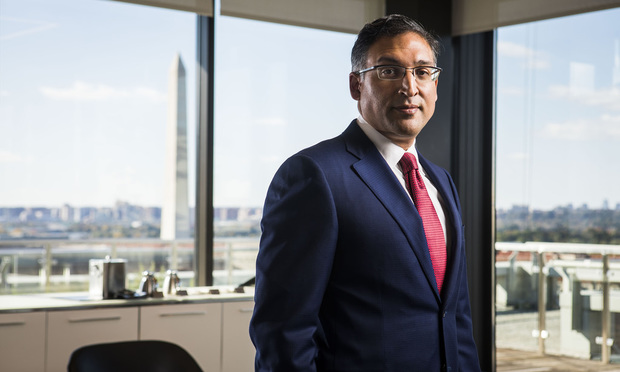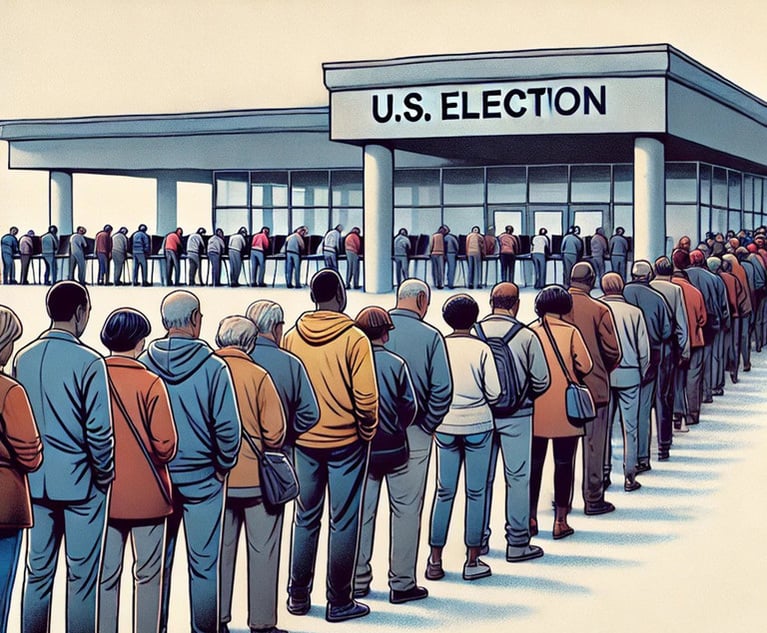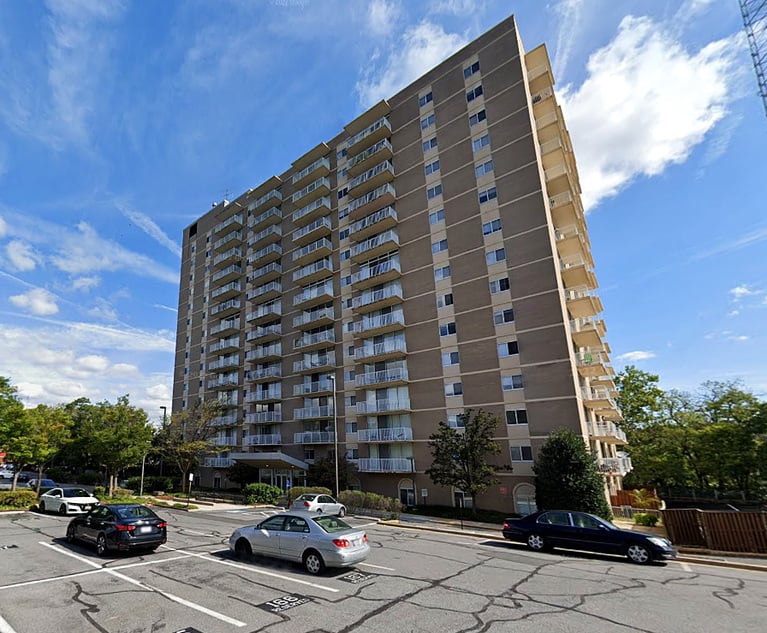Leading the SCOTUS Travel Ban Showdown
The Hogan Lovells team was among hundreds of attorneys who fanned out across the country to help those impacted by Trump's travel ban. On April 25, the firm stepped before the U.S. Supreme Court for oral arguments on the ban's third iteration.
April 30, 2018 at 02:00 AM
3 minute read

This article is part of National Law Journal's 2018 Pro Bono Hot List recognition package that celebrates law firms that do well by doing good. See the other stories here.
In the widespread chaos following President Donald Trump's original travel ban, more than 20 Hogan Lovells attorneys fanned out to help foreign nationals at airports in New York, Virginia and California. Little did they know then that 18 months and two revised travel bans later, one of their own would be leading the constitutional showdown with the Trump administration in the U.S. Supreme Court.
Since partner Neal Katyal, with Hawaii's attorney general, launched their legal attack on the first travel ban in March 2017, Katyal and an eight-lawyer Hogan team have been up and down the federal court pipeline multiple times.
“This was not an ordinary case,” said Katyal. “We kept arguing the case—and winning—and President Trump kept changing the ban and withdrawing these cases from the courts. So it's not one case; it has been three separate ones.”
By the time Katyal stepped before the Supreme Court on April 25 for arguments in travel ban 3.0, he estimated his team had devoted nearly 10,000 hours to the high-stake challenge.
“Neal and his exceptional team have been instrumental in Hawaii's ongoing efforts to fight the travel ban,” Hawaii Solicitor General Clyde Wadsworth said. “We very much appreciate their extraordinary and tireless work on this matter.”
Hogan's pro bono efforts in 2017, however, did not rest on the travel ban litigation.
Dogged representation of Virginia prisoners since 2011 by Hogan's April Wimberley and her team, along with The Virginian-Pilot newspaper, persuaded the state parole board that it was misinterpreting the state's “three strikes” law. The board changed its policy and as of November, an estimated 200 inmates became parole eligible.
Partner Kathryn Ali headed a litigation team that in 2015 challenged Virginia's solitary confinement of death row inmates. The state changed its policy but refused to make it permanent so Ali et al went back to court and won a landmark district court ruling that the policy violated the Eighth Amendment. “We've poured thousands of hours into this case and dozens have contributed their time,” she said.
The firm, she added, is using the Virginia case as a model for ongoing suits in Louisiana and South Carolina. The solitary confinement challenges are part of the firm's expanded pro bono representation of death row inmates in Arkansas, Nebraska, Florida, Texas and Arizona.
And over on the civil side, partner Ira Feinberg argued and won a preliminary injunction reopening voter registration for more than 8,000 people in a Georgia congressional runoff election.
All told, the firm committed more than 100,000 hours to pro bono matters at home last year.
This content has been archived. It is available through our partners, LexisNexis® and Bloomberg Law.
To view this content, please continue to their sites.
Not a Lexis Subscriber?
Subscribe Now
Not a Bloomberg Law Subscriber?
Subscribe Now
NOT FOR REPRINT
© 2025 ALM Global, LLC, All Rights Reserved. Request academic re-use from www.copyright.com. All other uses, submit a request to [email protected]. For more information visit Asset & Logo Licensing.
You Might Like
View All
LA-Area Law Firms Offer Support as Region Reckons With Raging Wildfires

Paladin Launches Pro Bono Election Protection Portal for Attorneys

'Graveyard Desecration'?: Md. Supreme Court Gives Descendants of Enslaved Persons Partial Victory in Property Row
5 minute read
Trending Stories
Who Got The Work
J. Brugh Lower of Gibbons has entered an appearance for industrial equipment supplier Devco Corporation in a pending trademark infringement lawsuit. The suit, accusing the defendant of selling knock-off Graco products, was filed Dec. 18 in New Jersey District Court by Rivkin Radler on behalf of Graco Inc. and Graco Minnesota. The case, assigned to U.S. District Judge Zahid N. Quraishi, is 3:24-cv-11294, Graco Inc. et al v. Devco Corporation.
Who Got The Work
Rebecca Maller-Stein and Kent A. Yalowitz of Arnold & Porter Kaye Scholer have entered their appearances for Hanaco Venture Capital and its executives, Lior Prosor and David Frankel, in a pending securities lawsuit. The action, filed on Dec. 24 in New York Southern District Court by Zell, Aron & Co. on behalf of Goldeneye Advisors, accuses the defendants of negligently and fraudulently managing the plaintiff's $1 million investment. The case, assigned to U.S. District Judge Vernon S. Broderick, is 1:24-cv-09918, Goldeneye Advisors, LLC v. Hanaco Venture Capital, Ltd. et al.
Who Got The Work
Attorneys from A&O Shearman has stepped in as defense counsel for Toronto-Dominion Bank and other defendants in a pending securities class action. The suit, filed Dec. 11 in New York Southern District Court by Bleichmar Fonti & Auld, accuses the defendants of concealing the bank's 'pervasive' deficiencies in regards to its compliance with the Bank Secrecy Act and the quality of its anti-money laundering controls. The case, assigned to U.S. District Judge Arun Subramanian, is 1:24-cv-09445, Gonzalez v. The Toronto-Dominion Bank et al.
Who Got The Work
Crown Castle International, a Pennsylvania company providing shared communications infrastructure, has turned to Luke D. Wolf of Gordon Rees Scully Mansukhani to fend off a pending breach-of-contract lawsuit. The court action, filed Nov. 25 in Michigan Eastern District Court by Hooper Hathaway PC on behalf of The Town Residences LLC, accuses Crown Castle of failing to transfer approximately $30,000 in utility payments from T-Mobile in breach of a roof-top lease and assignment agreement. The case, assigned to U.S. District Judge Susan K. Declercq, is 2:24-cv-13131, The Town Residences LLC v. T-Mobile US, Inc. et al.
Who Got The Work
Wilfred P. Coronato and Daniel M. Schwartz of McCarter & English have stepped in as defense counsel to Electrolux Home Products Inc. in a pending product liability lawsuit. The court action, filed Nov. 26 in New York Eastern District Court by Poulos Lopiccolo PC and Nagel Rice LLP on behalf of David Stern, alleges that the defendant's refrigerators’ drawers and shelving repeatedly break and fall apart within months after purchase. The case, assigned to U.S. District Judge Joan M. Azrack, is 2:24-cv-08204, Stern v. Electrolux Home Products, Inc.
Featured Firms
Law Offices of Gary Martin Hays & Associates, P.C.
(470) 294-1674
Law Offices of Mark E. Salomone
(857) 444-6468
Smith & Hassler
(713) 739-1250










